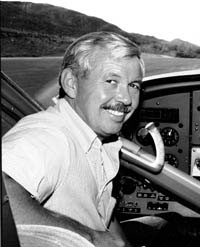 Candidate for the Ketchikan Borough Mayor - Three Year Term Published: Wednesday
The position of Mayor is considered the most important elected position in town. By virtue of being elected by residents, the mayor is acknowledged to be a civic leader, someone who has earned the confidence of the community. The mayor may not be the most powerful or even the most popular person in town. However, the mayor sits in a strong position and can use considerable influence in determining city finances, taxes, services, and other policies. The mayor runs the assembly meetings and will be expected to lead the assembly to resolution even on difficult issues. The mayor is a visible public figure frequently consulted or criticized about city affairs. Typically, the mayor has to work harder at his job than assembly members because he is expected to know about all of the issues facing the city. The position can be time consuming and even unrewarding, but it remains a position of responsibility and respect that can bring out the best in people and give hard working and committed Residents an opportunity for leadership.
In first class and home rule cities, the mayor is not a member of the assembly, but is elected separately. In second-class cities, the mayor is first elected as a assembly member, then elected by assembly members, or in a special election by the public, as the mayor. Notwithstanding this differing method of election, the position of mayor must be regarded as separate and distinct from the position of assembly member. This is due to the mayor's unique executive and administrative responsibilities, and because the mayor is chosen, whether by the voters or by assembly members, to the city's top leadership position. The mayor can be compared to a chairman of the board. He is charged with carrying out board (i.e., Assembly) directives, at the same time he is acknowledged to be the Leader of the assembly. In addition, the mayor is often expected to have a broader and more community-based perspective on issues than individual members of the assembly, who may be more responsive to certain viewpoints or certain groups of people in the community.
The mayor and Assembly are supposed to work together for the benefit of the entire community and its residents. Sometimes, though, the relationship between the mayor and the assembly can become confusing and lead to questions of just exactly who is in charge, and exactly who works for who? The mayor is acknowledged to be the political leader of the community. The mayor aso has executive and administrative powers, such as those granted in Alaska Statutes (Title 29) or the local code of ordinances that may be exercised without the prior Consent of the assembly. These could include hiring, evaluating and dismissing Employees; establishing committee memberships; or preparing or ordering the preparation of financial reports. On the other hand, the mayor may not adopt new policies, commit city finances, undertake new initiatives, or represent the official views of the city without prior assembly approval.
Typically, the assembly will be composed of people with differing points of view, just as there are many voices and points of view in the community. In making decisions and taking positions, the mayor is expected to hear and take into account all of the voices of the assembly, the weak as well as the strong. In doing so, the mayor will unavoidably accept the advice and opinions of some, and omit the advice and opinions of others.
The mayor is expected to take positions and make decisions, and in a practical sense, this means leaving some people "in" and other people "out." Assembly members understand this, and do not expect the mayor to try and bend to everyone's will. What assembly members do expect, though, is that the mayor will listen to them and take reasonable positions based on their ideas and advice. A mayor who does not listen to the assembly, or who discounts the advice of certain members even when it is sound, or who has obvious favorites and shows it, risks losing the full assembly's energy, input and support. Finally, the mayor has no interest in alienating a member of the assembly today, whose support he may need tomorrow.
The mayor must keep the assembly informed, not just selected members of the assembly, but the whole body. If the mayor fails to share with the assembly information it needs to make decisions, or to be fully informed on issues important to the community, it will breed suspicion and mistrust. People may believe the mayor has a hidden agenda, or is playing favorites, or has something to hide. A well-informed assembly is more capable of making good decisions and more likely to be responsive to the mayor's initiatives. Using the Assembly's Talents Assembly members have many personal abilities and talents that can be used for the benefit of the community. The mayor should keep in mind assembly members' abilities when making committee assignments. He should solicit advice from assembly members with specialized knowledge or expertise. For example, if the city is considering a sales tax, a member of the assembly who is a small business owner may have good ideas on reporting sales tax earnings or designing the reporting forms. The mayor should get to know assembly members according to their abilities, and according to their attitudes and other personal characteristics, so he knows when and how to use their talents.
Source: From The Mayor's Handbook- A Primer for Small Town Mayors
|
|||
